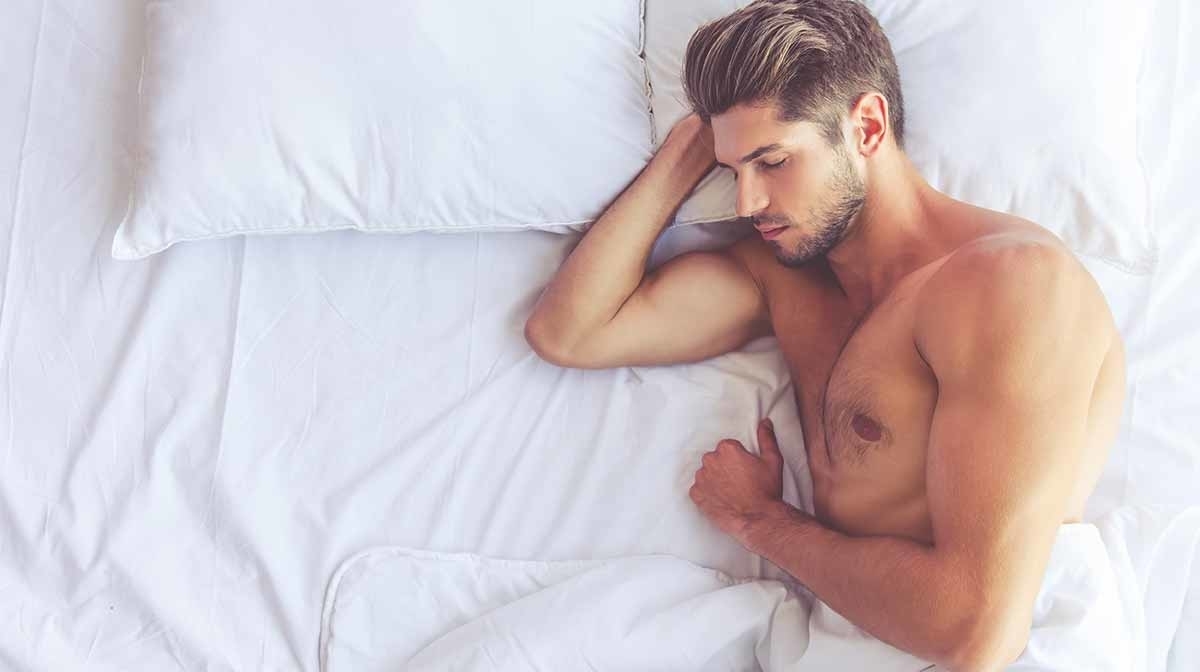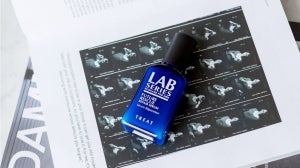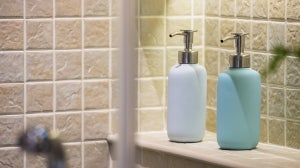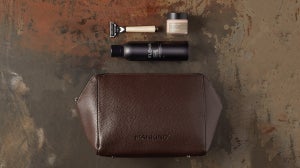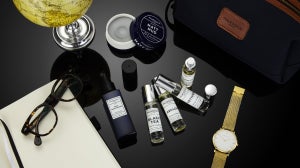
The Mankind philosophy is all about looking and feeling the best you can. And while we like to think we've got you covered on the skin, hair and general grooming fronts, we're firm believers that a healthy exterior starts from within. What's more, we love delivering solutions to your problems that are not only effective, but simple and fuss-free. What if we told you there's one method to look and feel great that's so simple you could do it in your sleep...
As today is World Sleep Day, we caught up with Dr Anna Persaud, the CEO of This Works, about the benefits of sleep.
1. Who are you, and what do you do?
I am Dr Anna Persaud, mother of 3 amazing children and CEO of This Works. My scientific background (I have a PhD in Biochemistry) and my obsession with skincare that honestly does what it says on the bottle, means that when we say “This Works” we can support our claims with robust clinical studies and user studies. Every product launched has been rigorously tested by our consumer panel of over 300 people and only they decide when the product is good enough to be launched and to earn the title “This Works”.
Over the past 8 years I have been immersed in understanding the role of sleep on skin health and how our natural body clock (known as our Circadian Rhythm) affects us. Working with experts in the field of Neurology, sleep and Circadian Rhythm we have developed skincare that works with our body clock and helps tackle sleep and skincare issues.
People who sleep well report higher energy levels, boosted self‐esteem and greater will power.
2. What is sleep and why is it so important?
Sleep is essential for life. When we sleep the nervous system is inactive; muscles relax and both senses and consciousness are vastly reduced or even suspended. It’s also essential for letting the body repair damage and renew tissue cells while the brain processes information.
3. What are the main benefits of sleep?
Essentially good sleep means better health and wellbeing. Daytime wakefulness is dictated by sufficient sleep and conversely a day which includes exercise leads to better sleep at night.
People who sleep well report higher energy levels, boosted self‐esteem and greater will power (they're much less likely to eat high sugar foods as a pick-me-up when they feel tired). Sleeping well is essential for mental clarity, a balanced mood and sharp memory function. Physically, it also helps hormones to balance stress and weight, keeps your immune system boosted and internal organs functioning properly.
4. Skin is a major concern for Mankind readers – what are the benefits of sleep for the skin?
The benefits of sleep for the skin are numerous, and each of them, overall, contributes to a brighter complexion. Overnight, skin goes into repair and restore mode, meaning it removes toxins, repairs cell and DNA damage caused by the environment, replaces ageing cells and creates new ones. That’s why after good quality sleep, skin looks fresher, younger and more radiant.

5. How much sleep should we aim for?
(Does it differ from person to person/how do we know we’re getting enough etc?) It varies between individuals, but studies suggest that approx. 8 hours is required for optimum health and wellbeing. If you wake up tired and spend the day feeling exhausted or desperate for a nap, you’re probably not getting enough sleep.
Vitally, put away your device and keep screens out of your bedroom.
6. What are the major downsides of not sleeping enough, or not getting enough quality sleep?
Prolonged lack of sleep has been linked to a number of serious health issues including diabetes, obesity and depression but after only a few nights of disrupted sleep there is a significant impact on memory, decision making and reaction time which can affect performance and output and also make those affected more prone to accidents.
7. How can we go about improving our sleep?
Make sleep a priority. You may be lucky and sleep well every night of the week but over a third of the population have suffered from sleeping problems for more than five years and we need to treat a lack of sleep as a health priority and to act accordingly.
Firstly, you need to understand if there is an underlying health issue that could be affecting your sleep and a chat with your GP would be advised.
Next, educate yourself on good sleep hygiene, such as minimising stimulation in the hours before bedtime. For the gym goer and exercise enthusiast this means not embarking on high intensity work outs in the late evening as this will raise Cortisol levels and core body temperature, thereby delaying sleep.
Avoid caffeinated drinks and chocolate as this also contains caffeine after noon and try not to drink too much alcohol as this can lead to poor quality sleep as the body breaks down the alcohol. Even if you sleep for the recommended 8 hours, you may not be getting the full benefits of sleep if you've had too much caffeine or alcohol.
To avoid the need to get up to use the loo in the middle of the night, reduce fluid intake before bedtime.
Also reduce the intensity of the lighting around you as this will help signal to the body that it is time to unwind. Light some candle or use low intensity light bulbs in the evening. Keep your bedroom cool (17 Degrees Celsius/65 degrees Farenheit) and try to minimise environmental noise.
Vitally, put away your device and keep screens out of your bedroom. Apart from the negative effects of blue light emitting devices on the sleep hormone Melatonin, the constant monitoring of our social media, emails and alerts means that our brains are overly stimulated at a time when we should be reducing stimulation and allowing our minds to become calmer, paving the way to sleep.
Finally, maximise relaxation by enjoying a good book that is not too exciting! Lying back in a warm a warm bath, not too hot in the hour before bedtime as this will also raise body temp and using calming aromatherapy products with essential oils that can help to relax the mind and encourage better sleep.
8. What kind of sleep aids are available? How do they work?
At This Works we offer two natural sleep solutions for people who are struggle with falling asleep and also those who struggle to stay asleep. Both our Deep Sleep and Seep Plus pillow sprays are blended with our 100% natural Deep Sleep Superblend of therapeutic grade essential oils; French True Lavender, Wild Chamomile and Vetivert. The difference between them is in how this fragrance is then released.
Deep sleep pillow spray releases an immediate burst of our sleep fragrance that is proven to calm a racing mind and ease you into sleep more quickly. In trials, 97% of users slept better than normal, 98% of users felt more refreshed in the morning and 89% of users fell asleep faster than normal.
Sleep plus pillow spray is micro‐encapsulated, with the fragrance captured in tiny spheres that break on the pillow as you toss and turn, continuously releasing fragrances throughout the night to support a longer and less interrupted sleep. In trials 94% of users felt less restless during the night, 97% of users felt more awake in the day, 96% of users felt they had a less disturbed sleep and 89% of users woke less often during the night.
9. How many pillows should you use?
To get all of the benefits of sleep you need to use the right pillow. A good pillow needs to align your head with your shoulders and spine as if you were upright and with the correct posture. There are differing reports for the ideal number of pillows we should use but if you can we recommend laying down on your bed and having someone check that your neck and upper back are in a straight line with your head fully supported.
10. What’s the best position to sleep in?
Again there are a number of differing recommendations on what position to sleep in to get the full benefits of sleep. For our skin health the most common train of thought is that sleeping on your back through the night limits the compression and tension our faces are subjected to overnight. For this reason, it may have a beneficial effect on your skin.
However, there are also arguments for sleeping on your side. According to elite sports coach Nick Littlehales, we should sleep in the foetal position, on our non‐dominant side. For right handed people this would mean sleeping on your left‐hand side. He considers this nature’s natural sleep position, as it means that we are able to use our dominant arm to protect ourselves if attacked in the night. In addition, there are emerging studies which suggest sleeping on your side encourages lymphatic drainage and the build‐up of waste chemicals in the brain.
-
Like this content? Check out our interviewLa Roche-Posay Dermatologist Dr Sarah Wakelin, or our piece on women who transformed the grooming industry, and keep up to speed with the Mankind blog.

